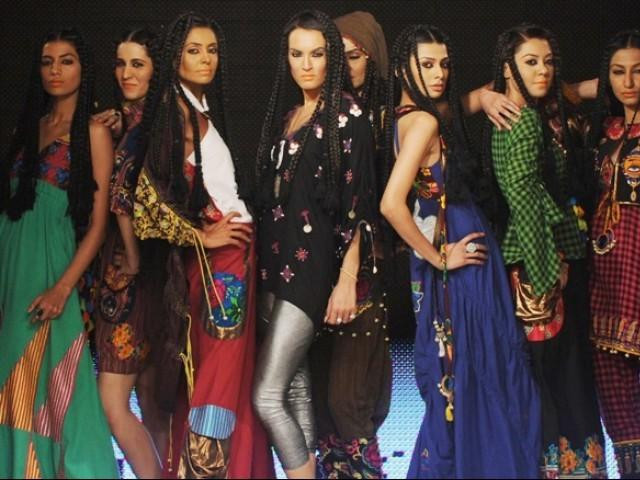There is no doubt that one of Pakistan's many gems is its fashion industry. As a Pakistani-American in love with both cultures and often finding myself having to choose between the two, I have no problem pledging my allegiances with the motherland when it comes to my wardrobe. Pakistani fashion is not only doable, it’s beautiful.
However when I peel my eyes away from the clothes and look at the models, all I see is stick-thin figures with jutting cheekbones and razor-sharp clavicles balanced on legs the width of a healthy person’s forearms, staring at the camera with a hungry look in their large, blank eyes. These girls are thin. I mean it. Many of them desperately need sandwiches.
The trend is recent, undeniably western, and inescapable - on runways, glossy magazine pages, and in music videos. The thin standard is an unspoken and largely visual rule, but our reliable-as-ever television hosts have no doubt used their spotlight to openly preach the virtues associated with maintaining a skinny frame as well.
I am sure most of us remember Shaadi Online from Geo TV and their hosts, flowing with pre-marital gems and advice to bestow upon their audience. My favorite (or least favorite) gem is one I will never forget. The wise uncle said:
"Chahey shakal surat ho na ho. rishtey ke waqt larki ka vazan zaroor dekha jaata hai."
(It doesn't matter if the girl is good looking or not, but her weight does matter at the time of the marriage proposal)
Nailed it.
Uncle couldn't have spelled out the rule more plainly if he tried; become thin and you win a husband.
The message is clear: thin is attractive, modern, sophisticated. It is the ultimate beauty ideal for the Pakistani woman.
How surprising, sad, and utterly unrepresentative of the traditional South Asian physique. A look back a few hundred years will tell a different story of what it once meant to be as beautiful as a South Asian woman. Mughal artists painted the women of the day with soft, curving strokes- the silhouette of a hip, the bend of an arm.
The flowing lines outlining the women of the Mughal period convey messages of femininity, fertility, and the celebration of flesh. They juxtapose almost comically against the harsh angles of today's ideal. Yesterday's women, once seen as the epitome of beauty, would be viewed today as the stark opposite of it. If they existed today, these women who once served as muses would be told that they're too fat and will probably never get married. "Vazan zaroor dekha jaata hai," they'd be informed. The latest of our people would have shunned the earliest of them.
So what do we gain when we lose our traditional standards of beauty and follow a western ideal? A whole lot of low self esteem, it appears.
A recent study was conducted in Pakistan on of both male and female university students in their early twenties. The study evaluated levels of Body Image Dissatisfaction (BID), in these young adults, and measured the findings against each subject's level of exposure to media.
The results confirmed the inevitable: young Pakistanis with high levels of media exposure are more likely to have greater BID than those with lower exposure levels. What’s more, many young women with high exposure levels who took part in the study vocalized a desire to conform to the thin standard. They saw themselves as outside of it. Outside of the very ideal shoved down their throats through the television and magazines surrounding them.
Pretty ironic, that a country with some of the lowest worldwide rates of obesity is facing increasing rates of young women perceiving themselves as overweight.
In a perfect world, the media industry would be held accountable for the negative messages it conveys to its mass viewership. Instilling a widespread sense of paranoia, low self-esteem, and unrealistic weight perceptions, however subconsciously, can only open the doors for the growth of unhealthy epidemics among young people in and outside of Pakistan, including eating disorders and the reliance on harmful third-party substances to control weight.
It seems as though the obsession is already beginning to take its toll. Time Magazine recently reported on a wave of teenage girls posting their videos on YouTube, seeking validation from complete strangers by asking bluntly-“Am I pretty or ugly?” In one clip, a girl says:
"I think I am ugly and fat, but all of my friends that are girls, they’re just like, oh you are so beautiful. I’m like ‘shut up, because I’m not beautiful.’”
[[http://www.youtube.com/watch?v=8D9mqqkgH-0]]
It's about time that the entertainment and media industry starts contributing to the prosperity of its viewership by presenting diverse, universal, and above all, realistic images of people conveying positive messages about health, beauty, and self-esteem.
In many countries, the media has stepped up to this challenge. In 2006, Spain banned models with an unhealthy body mass index (BMI) from walking the runway during Madrid Fashion Week as a response to the popularization of the rail-thin, “heroin-chic” look in models. The country continues its no-tolerance policy towards unhealthy images to this day.
There is no question that, like Spain, Pakistani media holds the power to affect change- the question is whether they will choose to do so, and if they do, whether the choice will be positive and accepting of the masses.



COMMENTS
Comments are moderated and generally will be posted if they are on-topic and not abusive.
For more information, please see our Comments FAQ